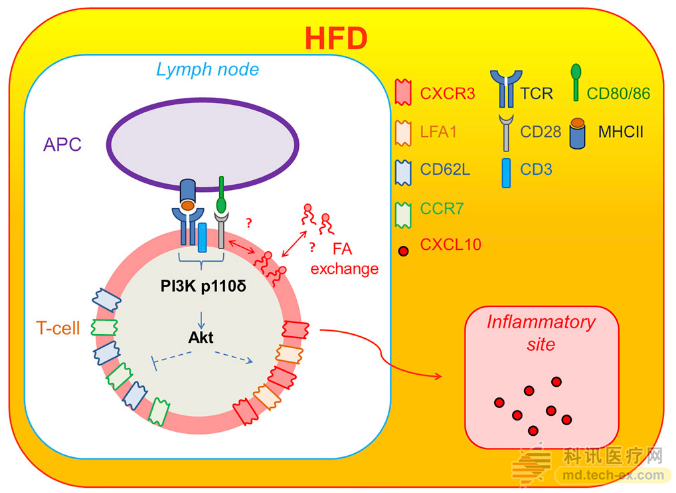CELL METAB: How does high-fat food cause cardiovascular disease? Activate the inflammatory response!
Release date: 2017-02-15

The inflammatory response is a double-edged sword that protects our body from pathogens and is the culprit of many diseases. In recent years, more and more studies have shown that cancer, diabetes, cardiovascular disease, and neurodegenerative diseases are all closely related to chronic inflammation. Recently, a study led by Queen Mary's College (QMUL) showed that obesity and a high-fat diet may cause harmful activation of the immune system, thereby increasing the risk of heart disease.
Previous studies have shown that obesity increases blood pressure and cholesterol, both of which are risk factors for heart disease. Now, researchers funded by the British Heart Foundation believe that obesity can also trigger an immune response that increases the risk of heart attacks. The findings paved the way for new treatments that target inflammation and reduce the risk of heart disease.
High-fat diet leads to CD4+ effector memory T cell production
The study, published in the journal Cell Metabolism, collected blood samples from 1,172 thin, overweight or obese people. The researchers found that certain types of T cells are higher in obese people. When the researchers measured the fat distribution of these people, they also found that people with more abdominal fat had higher levels of such cells than people with more fat in the legs and buttocks.
T cells are powerful white blood cells that play an important role in the immune response to protect the body from infection. However, they also cause inflammation and aggravate a variety of cardiovascular diseases. Many cardiovascular diseases are caused by arterial atherosclerosis. In atherosclerosis, fatty plaques accumulate in the arterial wall. These plaques contain fat, cholesterol cell waste, and the like. They accumulate in the arterial wall, causing the arteries to harden and narrow, and blood flow to be blocked. T cells can promote the accumulation of arterial fat spots in atherosclerosis, leading to a heart attack or stroke.
In animal experiments, the researchers found higher levels of T cells in mice fed a high-fat diet. By detecting the type of T cells, the researchers also found that a high-fat diet changes the development of T cells - producing more inflammatory effects on memory CD4 + T cells. It is also confirmed that the PI3K p110δ-Akt-dependent signaling pathway is the key to this developmental change. By inactivating this signaling pathway, this CD4+ developmental propensity can be corrected.

Pattern Picture Source: References
Anti-inflammatory drugs for cancer treatment or for treating heart disease
Professor Federica Marelli-Berg of the Queen Mary College's William Harvey Institute said: "Through this study, we found a direct link between diet, weight and harmful inflammation that can lead to heart disease.
"Drugs that target molecules that act on this inflammation have been used in clinical trials to treat cancer, so we may be able to reuse these drugs for heart disease."
Dr. Claudio Mauro added: "We next plan to test how long these high levels of harmful T cells will last in the blood. In addition, we do not know whether dieting will reduce the levels of these T cells and reduce heart disease. risk."
Professor Metin Avkiran, deputy director of medicine at the British Heart Foundation, said: “In the UK, every three minutes, someone enters the hospital because of a heart attack. We already know that overweight can increase blood pressure and lead to high cholesterol levels, which are bad for our heart. of."
“This study suggests that our diet may affect our cardiovascular health through the immune system. The good news is that by understanding the workings of this harmful inflammation, we are one step closer to finding a preventive approach. We need it now. More research to see if existing drugs can be used as a treatment for this harmful inflammation to reduce the risk of heart disease and produce better results than healthy diets."
Reference materials:
Obesity-Induced Metabolic Stress Leads to Biased Effector Memory CD4+ T Cell Differentiation via PI3K p110δ-Akt-Mediated Signals
Researchers find link between a high fat diet, obesity and cardiovascular disease risk
Source: Bio-Exploration
Collagen Peptide,Hydrolyzed Collagen,Collagen Supplement,Hydrolyzed Bovine Collagen
Ningbo Nutrition Food Technology Co.,ltd. , https://www.collagenworkshop.com